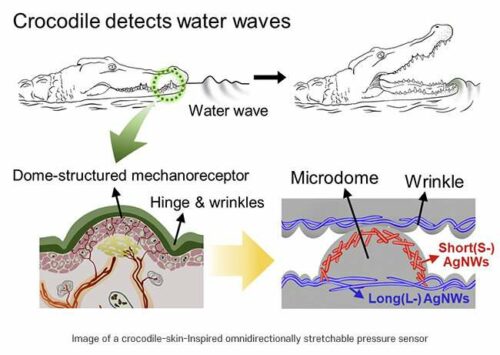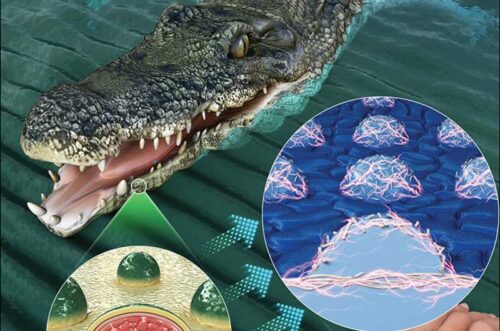Researchers, inspired by crocodile skin, have developed a sensitive stretchable electronic skin that can measure even slightest pressure.

Wearables like smart watches and fitbits have introduced a new interest among scientists, an electronic skin. Electronic skin can play an essential role in the healthcare industry. One of the key components of this technology is stretchable pressure sensors, which can detect various types of touch and pressure.
A team of researchers from POSTECH and the University of Ulsan in Korea has recently made a significant breakthrough by successfully creating omnidirectionally stretchable pressure sensors inspired by crocodile skin. They drew inspiration from the unique sensory organ of crocodile skin and developed pressure sensors with microdomes and wrinkled surfaces. The result was an omnidirectionally stretchable pressure sensor.
They have created a device that outperforms currently available pressure sensors using a hemispheric elastomeric polymer with delicate wrinkles containing either long or short nanowires. Unlike other sensors that lose sensitivity when subjected to mechanical deformations, this new sensor maintains its sensitivity even when stretched in one or two different directions.

The sensor can maintain high sensitivity to pressure even when subjected to significant deformation due to its fine wrinkled structure at the surface. When an external mechanical force is applied, the wrinkled structure unfolds, reducing stress on the hemispheric sensing area that is responsible for detecting applied pressure. This stress reduction enables the sensor to preserve its pressure sensitivity even under deformations. As a result, the new sensor exhibits exceptional sensitivity to pressure, even when stretched up to 100% in one direction and 50% in two different directions.
Researchers tested the device by mounting the sensor onto a plastic crocodile and submerged it in water. Interestingly, the mounted sensor was able to detect small water waves, successfully replicating the sensing capabilities of a crocodile’s sensory organ.
Researchers say that it could be used for diverse applications such as pressure sensors of prosthetics, electronic skin of soft robotics, VR, AR, and human-machine interfaces.
Reference : Giwon Lee et al, Crocodile‐Skin‐Inspired Omnidirectionally Stretchable Pressure Sensor (Small 52/2022), Small (2022). DOI: 10.1002/smll.202270287









